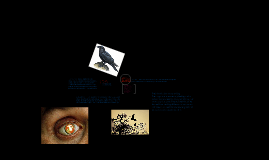Edgar Allan Poe
Transcript: "It will be found, in fact, that the ingenious are always fanciful, and the truly imaginative never otherwise than analytic."-From The Murders in the Rue Morogue Edgar Allan Poe Edgar Poe was born in Boston on January 19, 1809 His parents were David and Elizabeth Poe. When Edgar was 2 years old,his mom separated from her husband and took her three kids with her. Childhood: After his mother's death in 1811, His brother was raised by his grandparents while he was adopted by Mr. and Mrs. John Allan and his sister another family. John Allan was a successful merchant, so Edgar grew up in good surroundings and went to good schools.When He was 6, Edgar went to school in England for 5 years; there he learned Latin and French, as well as math and history.Edgar Allan went to the University of Virginia in 1826 and even though his father was wealthy he only gave Edgar about a third of what he needed. Although Edgar was very bright he began drink heavily and quickly became in debt. He had to quit school less than a year later. Poe In The Army: After all of his drama in college, Edgar Allan ended up with money, no job skills, and was shunned by John Allan. Edgar went to Boston and joined the U.S. Army in 1827. He did reasonably well in the Army and attained the rank of sergeant major. He was dismissed from the Army due to rule breaking and ignored duties. Life as a struggling writer: In 1831, Edgar Allan Poe went to New York City where he had some of his poetry published. He submitted stories to a number of magazines and they were all rejected. Poe had no friends, no job, and was in financial trouble. He sent a letter to John Allan begging for help but none came. John Allan died in 1834 and did not mention Edgar in his will.In 1835, Edgar finally got a job as an editor of a newspaper because of a contest he won with his story, "The Manuscript Found in a Bottle". He missed his Grandmother and his cousin Virginia. So he went to Richmond there he became the editor for the Southern Literary Messenger, Poe successfully managed the paper and increased its circulation from 500 to 3500 copies. Poe left the paper in early 1836, complaining of the poor salary. In 1837, Edgar went to New York. He wrote "The Narrative of Arthur Gordon Pym" but he could not find any financial success. He moved to Philadelphia in 1838 where he wrote "Ligeia" and "The Haunted Palace". His first volume of short stories, "Tales of the Grotesque and Arabesque" was published in 1839. Poe received the copyright and 20 copies of the book, but no money. In 1836, Edgar married his cousin, Virginia. He was 27 and she was 13. Sometime in 1840, Edgar Poe joined George R. Graham as an editor for Graham's Magazine. During the two years that Poe worked for Graham's, he published his first detective story, "The Murders in the Rue Morgue" and challenged readers to send in cryptograms, which he always solved.He left the magazine company to start his own,he tried to start a magazine called The Stylus which was a failure and he ended up jobless once again. On September 27, Poe left Richmond for New York. He went to Philadelphia and stayed with a friend named James P. Moss. On September 30, he meant to go to New York but supposedly took the wrong train to Baltimore. On October 3, Poe was found at Gunner's Hall, a public house at 44 East Lombard Street, and was taken to the hospital. He lapsed in and out of consciousness but was never able to explain exactly what happened to him. Edgar Allan Poe died in the hospital on Sunday, October 7, 1849. The mystery surrounding Poe's death has led to many myths and urban legends. The reality is that no one knows for sure what happened during the last few days of his life. Did Poe die from alcoholism? Was he mugged? Did he have rabies. No one would ever know. "Men have called me mad; but the question is not yet settled, whether madness is or is not the loftiest intelligence– whether much that is glorious– whether all that is profound– does not spring from disease of thought– from moods of mind exalted at the expense of the general intellect." - From "Elenora" Days after Poe’s death, his literary rival Rufus Griswold wrote a libelous obituary of the author in a misguided attempt at revenge for some of the offensive things Poe had said and written about him. Griswold followed the obituary with a memoir in which he portrayed Poe as a drunken, womanizing madman with no morals and no friends. Griswold’s attacks were meant to cause the public to dismiss Poe and his works, but the biography had exactly the opposite effect and instead drove the sales of Poe’s books higher than they had ever been during the author’s lifetime. Griswold’s distorted image of Poe created the Poe legend that lives to this day while Griswold is only remembered (if at all) as Poe’s first biographer Stories & Poems That I Love 1. Elenora-A love Story Poe was a very weird person but he also had feelings. It's different from his other stories which are dark and

















